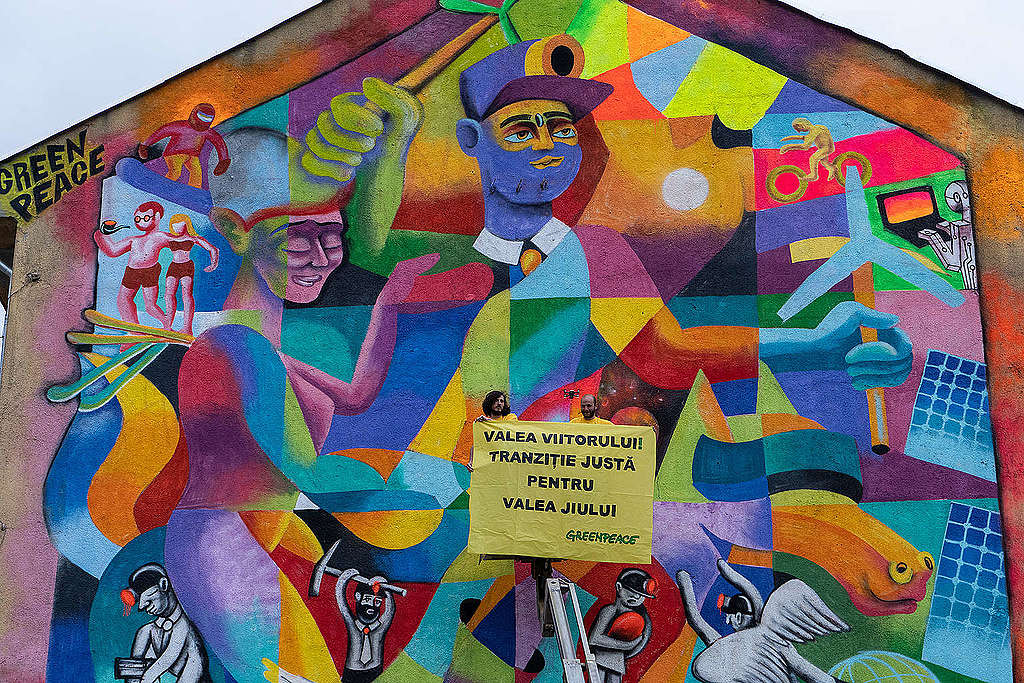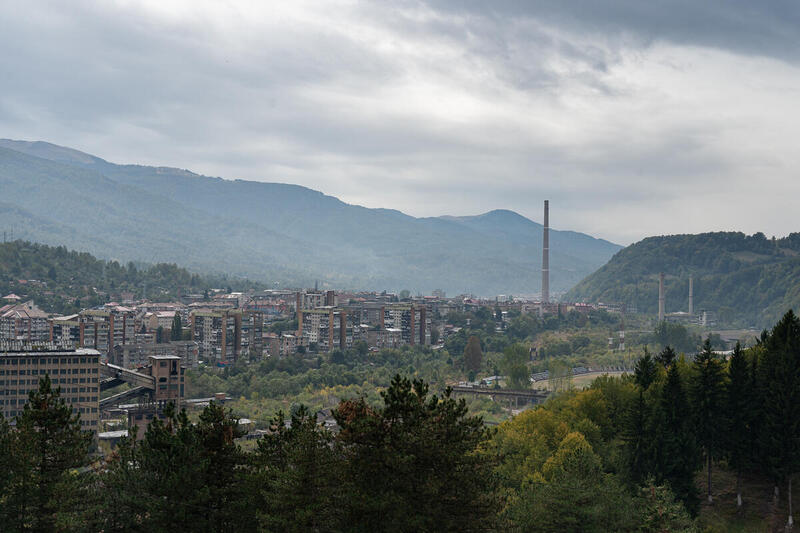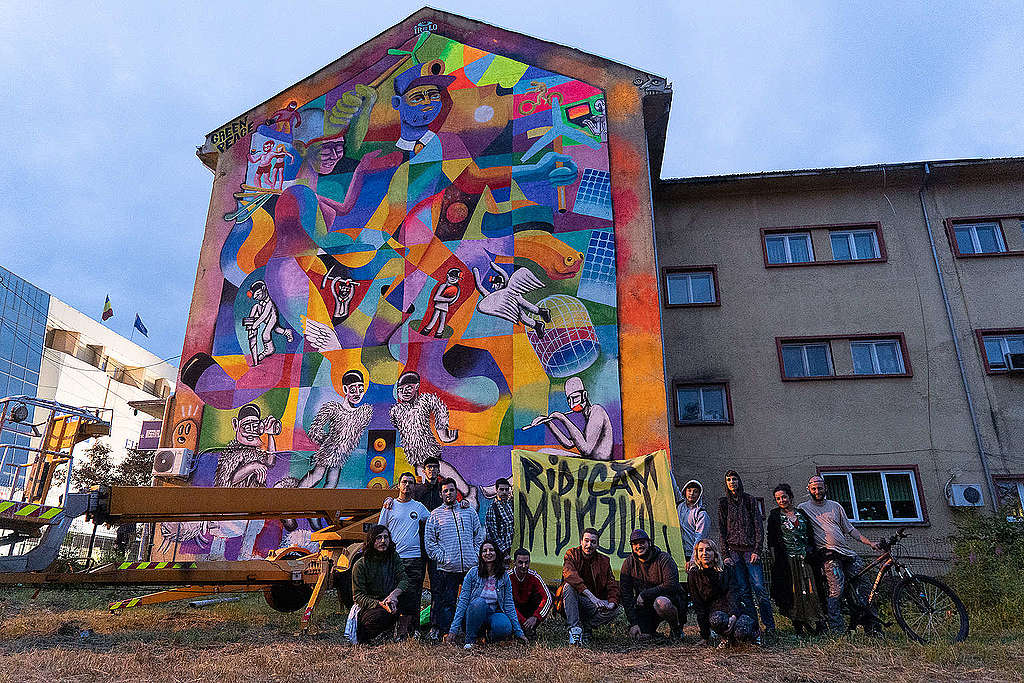
After weeks of community consultations, in 2020 Greenpeace Romania and Valea Jiului Implicată launched a street art project in Jui Valley on the challenges and opportunities in transitioning from coal, and people's visions for sustainable development. The first mural by artist IRLO went up in Petroșani city centre.
In a world moving away from fossil fuels, few areas need more support in this transition than those where local history, identity and jobs were shaped by the coal industry. As the long and very painful history of the restructuring of the coal industry in Romania proves, this transition away from fossil fuels is not easy but clean energy can help people maintain their local identity and embrace a sustainable future.
Losing jobs
Romania's coal restructuring started in the 90's, when economic inefficiency caused the sector to decline abruptly. Tens of thousands of people lost their jobs. This first "transition" left deep scars, poverty, social inequalities, and abandoned and stigmatised communities. One of the affected regions, Valea Jiului (Jiu Valley), became known as the Valley of Tears. Theirs was a failed transition.

Gaining power
In the last few years, we've entered the second and final stage of the transition. In these times of climate emergency, Greenpeace Romania has been demanding the closure of mining operations and coal plants. We've been loud and clear: this time the transition in these regions should be a just transition towards renewable energy. Because in the next couple of years more than 7000 coal miners and their families will be directly affected by this process.
We were invited to participate in development of the region's just transition plans towards cheaper, cleaner energy and green jobs. In February we started to read about the creation of energy communities and thought, "Wait a minute! What if some of these energy communities could emerge in the coal regions?"
What if the Decarbonisation Law would include subsidies for energy communities? What if these mining regions and their people, who until recently were facing a dead end, instead had the chance to preserve their local identity and independence, established around the energy sector - and to actively participate in bringing the vision for a sustainable future to life.
What if …
What if the transition plan included subsidies for energy communities as a social support for workers? Even better, what if before offering money for energy communities, the authorities offered money to each person that would be laid off? Money to enable the purchase of photovoltaic systems (to convert light into electricity) sufficient to meet the estimated electricity needs for an average household.
In other words, what if miners converted into 'prosumers' - individuals who both consume and produce electricity - and then organised into energy communities?
We said "OK! We have the idea, let's present it to different local and central authorities and test it." And last year, it finally happened - the idea developed for mining communities took off!
Coal phaseout kicks in
Romania announced 2032 as the coal phaseout year in its Recovery and Resilience Plan. This summer, a Decarbonisation law was passed by the Romanian government. The law includes decommissioning and closure of all installed energy capacity based on lignite and coal, securing the mining installations and the old deposits, and greening works for former quarries and mines. The law also includes state aid measures in order to reduce the socio-economic impact for workers and their communities.
Transition underway
To our surprise, the authority managing the Territorial Just Transition Plans included the idea of prosumers and energy communities in their official strategy document and announced they would finance it through a Just Transition Operational Programme, and that the idea was accepted by the EU Commission. They even said they would extend the programme to the other four regions in transition that are not coal regions.
There is also a special fund dedicated called Just Transition Fund to help regions with economic diversification (small and medium enterprises in areas such as tourism, education, industry, agriculture, etc), creating new jobs, offering re-skilling for workers, developing entrepreneurship and supporting investments in clean energy technologies.
To reduce the social impact of the transition to net zero, two very important actions will be supported among others:
- Investment in developing small scale projects for the production, transport and storage of renewable energy required for public buildings in schools, hospitals, social services and other public buildings
- Installation of photovoltaic / photothermal panels at household level, as part of the European initiative for solar rooftops.

New life begins
This is the best way to help people combat energy poverty and lay the groundwork for a local, circular economy: with the creation of self-sufficient energy communities, where the local population is able to meet its own energy production needs. It gives new life to the region. This is where it all begins!
Being part of major social changes, means finding ways of working together, with every stakeholder. At this point, working with authorities is crucial, because in Romania a legal framework for initiating energy community projects does not yet exist. To gain the support of legislators, we are planning with the Minister of Investments and European Projects to co-organise an online workshop on energy communities, where we will invite local authorities from all the Romanian regions that are undergoing transition.
This is one of the first steps in our transformation plan and in this way we hope to plant the seeds of energy transition.
Vlad Catună is a Campaign Coordinator for Greenpeace Central Eastern Europe in Romania.
If you like this story, you can find more stories like this at common-power.org






